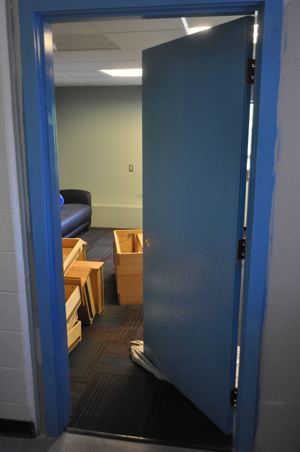by Aaron Butts
For the past two weeks, numerous students have been living at the Fort Rapids Indoor Water Park. As of yesterday however, all students who were relocated due to lack of housing have been moved back on to campus.
For the students, living at Fort Rapids was what most students would have expected. Assistant director of Residence Life Jon Geyer answered the question of how the whole two weeks went by saying “Swimmingly, everything went really great.”
They focused on getting students back as soon as possible, taking concerns for the students into account “We wanted to move them over the weekend so it wouldn’t interfere with classes or extracurricular activities.” Geyer said.
Much of this process was aided, according to Director of Residence Life Jennie Smith, thanks to the cooperation of the students, “What made this process better was the students we were working with. They were patient and communicative.” She said.
Both Geyer and Smith agreed that everything went better than planned with working with Fort Rapids, “The staff at Fort Rapids was extremely accommodating.” Geyer said, “There were no issues brought up by students or by Fort Rapids.”Sticking to their goal to move students back to campus after two weeks, Residence Life worked overtime to find spots for students, “We looked at floor plans and spots on campus that could either be converted to student’s rooms, or already were rooms and then were converted for other uses.” Smith said.
Residence life has utilized numerous options available to them by moving students into newly freed rooms in Saylor Ackerman Hall, as well as converting the four lounges in Schaaf and the third floor lounge of the Lohman complex back into rooms for students which is what they were intended for in years previous. “We’re at that point where we are bursting at the seams in a good way, and we needed to repurpose those rooms.” Geyer said.
Smith pointed out that many of these rooms were simply shifted around, “We had some students on the co-ed Healthy Choices hall of SA who moved to openings we had in women’s halls in Schaaf, opening spots for new men to move back.” She said.
In cooperation with facilities and housekeeping, they were able to work with haste to move students back on to campus as soon as possible. “The timeline that they operated in was phenomenal.” Geyer said.
Smith agreed, “Because it was such a team effort, I think it turned out great.” She said, “We wanted it to work the best that it could, but we knew it wouldn’t be perfect.”
However, not enough rooms were available to repurpose and so Capital was forced to make rooms. In Cotterman for instance, the computer lab and the vending machine room have both been converted into three person bedrooms with brand new drywall put up to enclose them in a room similar to that of other student rooms in Cotterman.
“We hated to take these spaces,” Smith said, reflecting on the usage of common spaces in Cotterman, Schaaf, and SA that were converted, “The good thing about Cotterman is
that there was a lot of under-utilized space. We still have plenty of space for the computer lab and vending machines.”
Hayden Brown, one of the sophomores that was relocated to Fort Rapids, is one of those students that is now living in a converted room in Cotterman which has almost all the same characteristics of a normal room, except for a closet or a mirror.
The only drawback for some students was the infrequency of shuttles running to and from campus, making the experience feel more like being a commuter. “It was a much bigger inconvenience than anyone anticipated.” Brown said, describing one of his roommates who had to leave at 7 in the morning for a shuttle to make it to his first class at 9:30 because another shuttle didn’t run until after his class had started.
Brown, who felt angry as this whole situation unfolded over the summer, still has some concerns, but is gradually starting to recognize the reality of the situation that he and the
University is in and pointed out what he thinks the University needs to do
to avoid this problem from happening again, “They shouldn’t take on as many students as they did, but we know why they do it, it’s not a secret.” He said, “I don’t even know that its Capital’s fault. You gotta do what you gotta do to stay afloat.”
Looking forward, Capital is hoping that this experience will better prepare them for the next year. However as class sizes and retention rates increase, less and less space may be available as an option to Capital students.
Brown has a less optimistic outlook, as the whole process has made him face the reality of his situation, “I think that all of this is irrelevant. That they’re not going to do anything despite what we say. They’re going to do what they need to do to stay relevant.” Brown said, admitting that despite the concerns and frustration that he still holds, there isn’t much that can be done, “I’m still here aren’t I? I can complain about it, but as long as I continue to hand them my money they’ve still won.”
abutts@capital.edu

